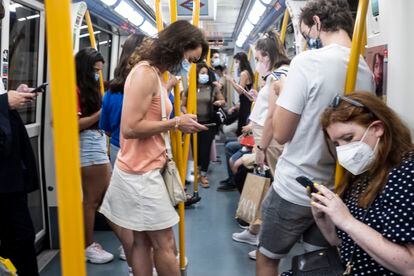People check their cell phones on a Madrid subway.david expósito
During the cellphone's infancy, one needed to adopt essential habits to avoid the risk of degrading the first phones' already low battery life.
People who experienced those years of the telecommunications revolution are familiar with the “memory effect” of batteries, a phenomenon that ruined the battery life of the first cellphones on the market.
Because of this effect, the battery degraded prematurely if it was not fully charged.
While this issue affected the first generation of batteries, today's widely used lithium-ion batteries have completely eliminated the problem.
Even today, however, there are still people who discourage charging cell phones only partially.
Indeed, the battery issue is a myth that still ensnares many users.
Which long-held beliefs remain about cellphones?
Here are the most common ones:
Myth 1: Charging your cellphone overnight damages the battery
This is one of the most enduring beliefs.
Some people still charge their cell phones and unplug them as soon as the battery is fully charged.
Doing so is not necessary.
Modern phones (especially their platforms) have charge-management systems that prevent possible degradation.
The main problem that a cellphone plugged into an outlet could cause is overcharging, that is, the charger continues to power the battery when it is already at maximum capacity.
But the risk of overcharging modern cellphones is non-existent.
Today's cellphones have intelligent charge-management systems.
When the battery is fully charged, additional power intake is cut off.
Apple even has an optimized charging system that takes into account the user's charging habits.
This charging system shuts off the power supply when the device is 80% charged;
then, it continues to charge so that the battery is full when the user wakes up.
For its part, Samsung confirms that the batteries currently in use are not affected by “the myths of charging,” as the company puts it.
“The negative impact of excess charge over a long period of time is negligible,” explains Santiago Izquierdo, the technical product manager at Samsung Iberia Electronics.
“Even so, the phone does not continue charging after the battery is 100% full;
the charge stops and recharges when [the battery] drops below 100%.”
“Usually, batteries are replaced because of their natural degradation, and [that's] only in high-end models.
It is very difficult to damage a modern battery by charging it wrong,” Javier Sánchez-Romero, CEO of the cell phone repair company Bemovil, explains to EL PAÍS.
In short, you can safely leave your cell phone connected to the charger when you go to bed;
it's not a problem.
Myth 2: You must shut down apps to optimize cellphone performance and battery life
As with the battery, long-held beliefs about forcing applications to close have endured over time.
People perform the classic gesture of swiping upwards on the screen to shut down an app, believing that processes that drain the battery and affect performance are still running in the background.
Once again, the opposite is true.
Cell phones are smart enough to manage these resources;
altering the phone's management system by forcing apps to close can only make things worse.
Craig Federighi, head of iOS—iPhone's operating system—even went so far as to debunk this false belief in an email response to a customer.
The systems put apps that are not in use “to sleep” and park them to be opened again when one wants to use them;
if they are reopened at the user's request, part of the process has already been launched, which saves resources.
That is, by forcing an app to completely shut down, the system must reload everything again, which paradoxically consumes more resources than simply switching apps.
“It is not necessary to close each application after using it,” explains Izquierdo, “the fact that it remains open means that the next time [the app] is used, it will start up faster, since it does not have to be loaded again,” he says.
Myth 3: To save battery life, you should disable Wi-Fi and Bluetooth
On its website, Apple suggests always having Wi-Fi enabled to save battery life: “There are two very simple ways to preserve battery life: adjust the screen brightness and use Wi-Fi.”
Why does keeping Wi-Fi on help us save battery life?
On the one hand, this wireless technology is more efficient at consuming resources than a direct data connection with the service provider.
On the other hand, modern cellphones use the wireless connection to locate the device instead of GPS, which consumes more battery and is only activated when an application that needs it is opened.
“One problem is using your data plan when a good Wi-Fi network is available.
If we use 4G on the street, we are already using more battery than we do when Wi-Fi is enabled.
Looking for good reception wastes more battery life than having Wi-Fi enabled,” explains Fran Besora,
Similarly, the new versions of Bluetooth are designed to have a negligible effect on the battery.
Battery consumption tests showed no difference between when Bluetooth is enabled and when it is disabled.
However, actively using the Bluetooth connection—to listen to music, for example—does impact battery performance.

